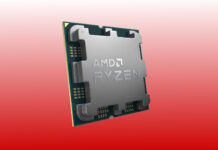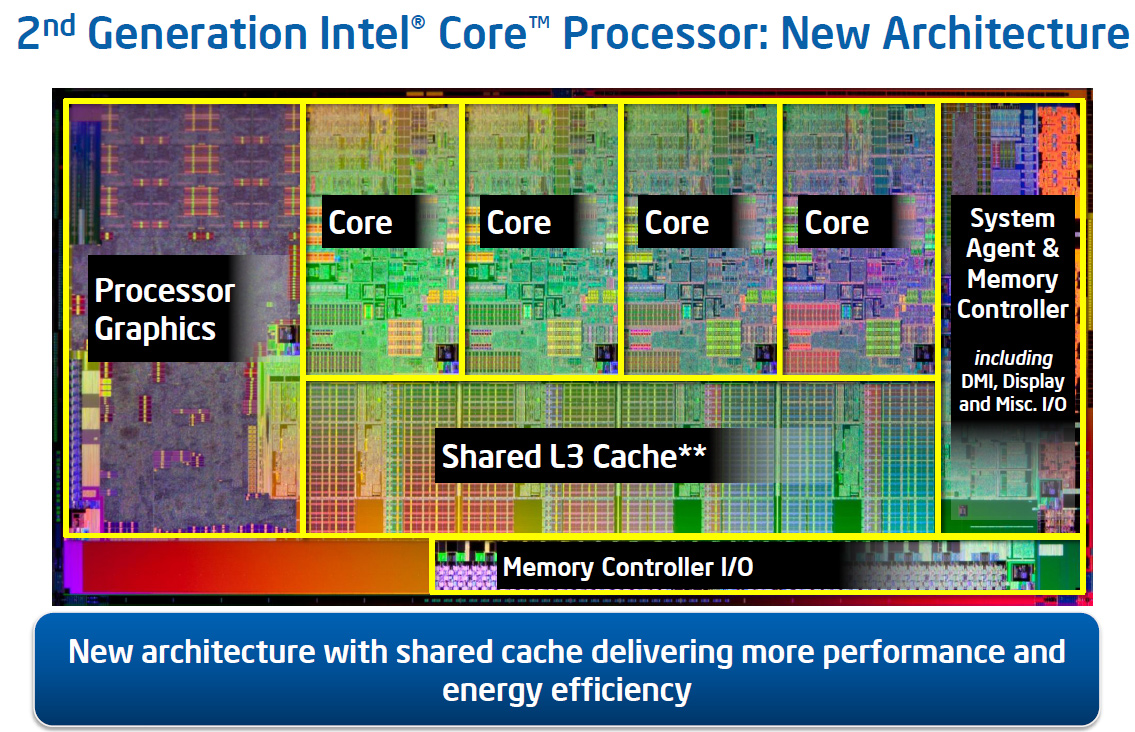Intel raised the media embargo of the new processor platform Sandy Bridge two days ahead of what both partners and media had counted on around these parts. The new mid-range platform is Intel’s first fresh microarchitecture in two years and the first with CPU and GPU on the same silicon with 32nm technology.
Sandy Bridge introduces a whole new platform where the new LGA1155 socket is powered by Intel’s new P67 and H67 chipsets. Intel P67 is intended as the performance chipset for users with discrete graphics, while Intel H67 draws use from the integrated GPU.
Intel has launched an array of processors code-named Sandy Bridge in a variety of series. From quad-cores down to dual-cores;

|
Model
|
Cores / Threads
|
Clock / Turbo
|
L3 Cache
|
GPU clock/ Turbo
|
EUs |
TDP
|
|
Core i7-2600K
|
4 / 8
|
3,4 / 3,8 GHz
|
8 MB
|
850 / 1.350 MHz
|
12 |
95 W
|
|
Core i7-2600
|
4 / 8
|
3,4 / 3,8 GHz
|
8 MB
|
850 / 1.350 MHz
|
12 |
95 W
|
|
Core i7-2600S
|
4 / 8
|
2,8 / 3,8 GHz
|
8 MB
|
850 / 1.100 MHz
|
12 |
65 W
|
|
Core i5-2500K
|
4 / 4
|
3,3 / 3,7 GHz
|
6 MB
|
850 / 1.100 MHz
|
12 |
95 W
|
|
Core i5-2500
|
4 / 4
|
3,3 / 3,7 GHz
|
6 MB
|
850 / 1.100 MHz
|
12 |
95 W
|
|
Core i5-2500S
|
4 / 4
|
2,7 / 3,7 GHz
|
6 MB
|
850 / 1.100 MHz
|
12 |
65 W
|
|
Core i5-2500T
|
4 / 4
|
2,3 / 3,3 GHz
|
6 MB
|
650 / 1.250 MHz
|
12 |
45 W
|
|
Core i5-2400
|
4 / 4
|
3,1 / 3,4 GHz
|
6 MB
|
850 / 1.100 MHz
|
6 |
95 W
|
|
Core i5-2400S
|
4 / 4
|
2,5 / 3,3 GHz
|
6 MB
|
850 / 1.100 MHz
|
6 |
65 W
|
|
Core i5-2390T
|
2 / 4
|
2,7 / 3,5 GHz
|
3 MB
|
650 / 1.100 MHz
|
6 |
35 W
|
|
Core i3-2120
|
2 / 4
|
3,3 / – GHz
|
3 MB
|
850 / 1.100 MHz
|
6 |
65 W
|
|
Core i3-2100
|
2 / 4
|
3,1 / – GHz
|
3 MB
|
850 / 1.100 MHz
|
6 |
65 W
|
|
Core i3-2100T
|
2 / 4
|
2,5 / – GHz
|
3 MB
|
650 / 1.100 MHz
|
6 |
35 W
|
|
Model
|
Cores /Threads
|
Clock / Turbo
|
L3 Cache
|
GPU clock/Turbo | EUs |
TDP
|
|
Core i7-2920XM
|
4 / 8
|
2,5 / 3,5 GHz
|
8 MB
|
650 MHz/1300 MHz | 12 |
55 W
|
|
Core i7-2820QM
|
4 / 8
|
2,3 / 3,4 GHz
|
8 MB
|
650 MHz/1300 MHz | 12 |
45 W
|
|
Core i7-2720QM
|
4 / 8
|
2,2 / 3,3 GHz
|
6 MB
|
650 MHz/1300 MHz | 12 |
45 W
|
|
Core i7-2620M
|
2 / 4
|
2,7 / 3,4 GHz
|
4 MB
|
650 MHz/1300 MHz | 12 |
35 W
|
|
Core i5-2540M
|
2 / 4
|
2,6 / 3,3 GHz
|
3 MB
|
650 MHz/1300 MHz | 12 |
35 W
|
|
Core i5-2520M
|
2 / 4
|
2,5 / 3,2 GHz
|
3 MB
|
650 MHz/1300 MHz | 12 |
35 W
|
Worth noting is that Intel’s S and T models are energy efficient version of the regular processors, that most often is found with OEMs. The K models are unlocked models that can be overclocked without changing the bus frequency, something Sandy Bridge isn’t that fond of. The positive news is that overclocks near 5.0 GHz on regular air cooling is a piece of cake with the unlocked K models. We reached 4.8 GHz on a quick run.
The integrated graphics of Sandy Bridge has either 6 or 12 calculation units (EUs) that we knew would be better, which is also confirmed by official reviews.
Intel’s new Sandy Bridge architecture offers other functionality like a dedicated media processor for decoding movies or just playing them. Intel has also tweaked the Turbo function and the result is some very fast Sandy Bridge processors, not the least in applications that doesn’t use all threads.
Unfortunately the new embargo date wasn’t spread that well to the Nordics or some parts of Europe, it was sent out by Intel on December 30th, 2010. We now know that the launch was moved up to January 3rd. Below are some of the reviews that has appeared.
















